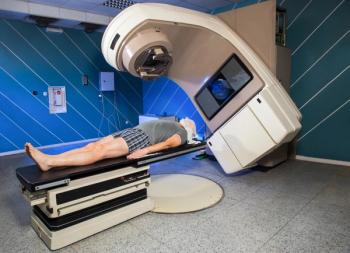
The final guidance provides the agency’s current thinking regarding steps to broaden eligibility criteria in clinical trials through inclusive trial practices, trial designs, and methodological approaches.

Your AI-Trained Oncology Knowledge Connection!


The final guidance provides the agency’s current thinking regarding steps to broaden eligibility criteria in clinical trials through inclusive trial practices, trial designs, and methodological approaches.

The phase 3 KEYNOTE-581/CLEAR trial (Study 307) demonstrated that both combinations saw meaningful improvements in the study’s primary end point of progression-free survival for patients with advanced renal cell carcinoma.

Merck is discontinuing the study after an independent Data Monitoring Committee recommendation, which determined the benefit/risk profile of pembrolizumab in combination with ipilimumab did not support continuing the trial.

“The data reported, in addition to its ease of use, demonstrate the potential of [tavokinogene telseplasmid] in combination with pembrolizumab as a next-generation intratumoral IL-12 therapy that can induce regression of both locally treated and untreated distant and visceral lesions,” said Paolo A. Ascierto, MD.

In our gastric cancer quiz, you’ll get to test your knowledge on the prevalence of gastric cancer and what differentiates patients with early-onset gastric cancer.

The survey highlighted the need for further research into the specific effects of ITP in individual patients so that these findings can be better integrated into the management of this patient population.

The results of the phase 2 Study 218 indicated that the lower starting dose of 14 mg of lenvatinib (Lenvima) did not meet the threshold for non-inferiority compared to the FDA-approved starting dose of 18 mg.

The FDA has approved the FoundationOne Liquid CDx to identify patients with BRCA1, BRCA2, and/or ATM alterations in patients with metastatic castration-resistant prostate cancer who may be appropriate for treatment with olaparib.

Jeffrey Schneider, MD, and Marc Braunstein, MD, PhD, spoke about their recent article published in the journal ONCOLOGY® regarding the management of patients with cancer during the COVID-19 pandemic.

Results from this study suggest that this combination is active and should be considered for this patient population, though additional research is still necessary.

This study suggested that there is evidence, though low quality, that rituximab (Rituxan) may be a more effective second-line therapy than splenectomy for children with immune thrombocytopenia.

For adult patients with relapsed or refractory T-cell acute lymphoblastic leukemia/T-cell lymphoblastic lymphoma, a phase 1 clinical trial revealed that crenigacestat (LY3039478) demonstrated little clinical activity at the recommended dose.

Patients with immune thrombocytopenia treated with rituximab (Rituxan), splenectomy, eltrombopag (Promacta), or romiplostim (Nplate) saw significant increases in platelet count with each of the 4 treatments.

The study suggested that voriconazole (Vfend) may be the best prophylaxis option for patients undergoing HSCT, and posaconazole (Noxafil) may be the best prophylaxis option for patients with AML or MDS.

In a mock tumor board on prostate cancer on Twitter, health care providers came together to discuss real patient cases and present various treatment options for review.

In working patients with head and neck cancer receiving radiotherapy, weight loss and an increase in pain, fatigue, and ECOG status were all found to be significantly associated with reductions in working days per week.

This study suggested that the racial composition of clinical trials involving radiation therapy does not match that of the overall US population.

A study presented at the ASTRO Annual Meeting found that adding the advanced PET radiotracer fluciclovine (Axumin) to conventional imaging for patients with recurrent prostate cancer may improve disease-free survival rates.

“Sexual dysfunction is an unfortunately common side effect of cancer treatment, and there appears to be a large gender disparity in how physicians discuss sexual health with their patients,” said lead study author James Taylor, MD, MPH.

Researchers found there has been a 17% growth in radiation therapy facilities over the last 15 years, with expansion specifically improving for those who already live near such facilities.

The leukemia expert spoke about the importance of genetic testing for patients with acute myeloid leukemia and other important considerations for this patient population throughout the pandemic.

The phase 3 SEAL study evaluating single agent, oral selinexor (Xpovio) versus matching placebo in patients with advanced unresectable dedifferentiated liposarcoma met its primary end point of a statistically significant increase in progression-free survival.

This study indicated that patients with up to 3 lung metastases from primary tumors in other sites who were treated with stereotactic body radiation therapy fared comparably well whether their radiation was delivered in 1 or 4 treatment sessions.

The FDA has lifted the clinical hold on the phase 1 study of P-PSMA-101 in patients with metastatic castration-resistant prostate cancer.

The DESTINY-Breast05 trial will investigate fam-trastuzumab deruxtecan-nxki (Enhertu) versus ado-trastuzumab emtansine (T-DM1) as adjuvant therapy in patients with HER2-positive early breast cancer who have a high risk of disease recurrence and residual invasive disease in the breast or axillary lymph nodes after receiving neoadjuvant therapy.

A series of studies indicated that genetic alterations in the BRCA2, PALB2, and ATM genes are associated with prostate cancer risk in men that have a strong family history of prostate cancer and also increases their risk of an aggressive form of the disease.

This study found that fragment analysis had the ability to detect large MET exon 14 skipping deletions that were missed by next-generation sequencing in non-small cell lung cancer tumor samples.

This study found that Black patients with extensive-stage small cell lung cancer were less likely to receive chemotherapy, as were elderly, uninsured, and those with non-private insurance.

This 20-year analysis suggested that weight loss surgery significantly decreases the risk of developing pancreatic cancer in individuals who are obese with diabetes.

First-line cabozantinib was found to provide longer quality-adjusted time without symptoms of disease or toxicity of treatment (Q-TWiST) in patients with advanced renal cell carcinoma when compared with sunitinib.